-
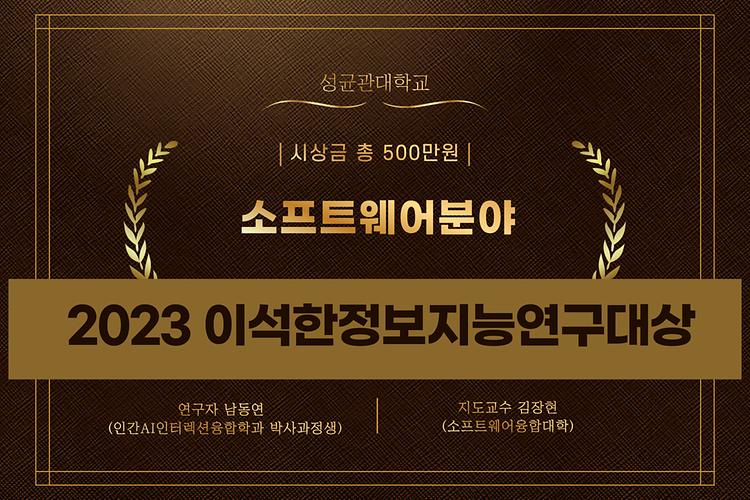
- 2023 Seok-Han Lee Information Intelligence Awards
- Software Convergence College Dong-Yeon Nam(Human&AI Interaction Convergence Department Phd) and Leading-Professor Jang-Heon Kim(Dean of Faculty) has been awarded with 2023 Seok-Han Lee Information Intelligence Awards in Software Field, which is an award to credit Information Intelligence Phd students with their excellent researches. -Award: 5,000,000 Won ※ Student(Researcher): 3,000,000 Won, Leading-Professor: 2,000,000 Won
-
- 작성일 2024-02-06
- 조회수 504
-
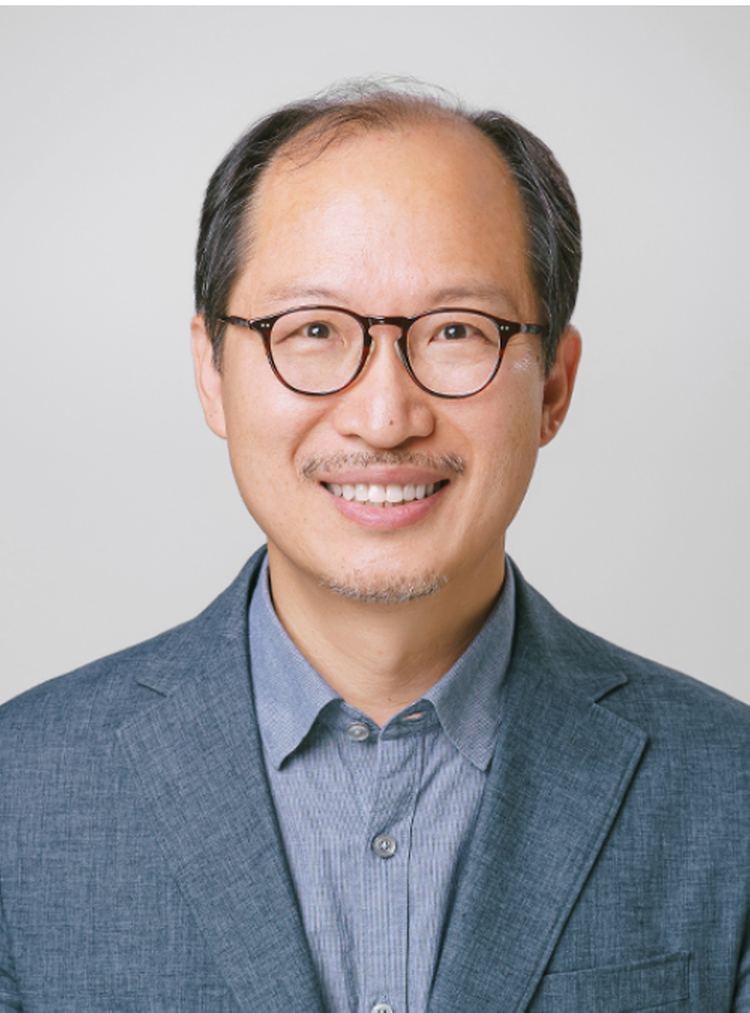
- Professor Lee Ji-hyeong from the Graduate School of Artificial Intelligence has received the Minister of Science Award
- Professor Lee Ji-hyeong from the Department of Artificial Intelligence at the Graduate School of Artificial Intelligence was awarded the Minister of Science, ICT, and Future Planning Award on December 31, 2023 (Sunday) in recognition of his outstanding contributions to the advancement of digital talent development. Professor Lee Ji-hyeong is currently responsible for the selection and oversight of the National Graduate School of Artificial Intelligence Support Project, the first of its kind in the country. Under his leadership, the program has been successfully training an average of over 150 advanced AI professionals at the master's and doctoral levels annually. The Graduate School of Artificial Intelligence aims to cultivate a Mega AI, an artificial intelligence that can integrate and analyze situational information in various work environments (Multi-modal) and respond in real-time (Expeditive) and proactively (Generative) in an actionable manner. To achieve this goal, the school has been leading various programs in education, research, industry-academia collaboration, and internationalization. In addition, Professor Lee Ji-hyeong has been selected for the 4th stage of the BK21 Project (Future Talent Development Project) for the years 2024 to 2027. He will be involved in the education and research operations for the development of future computing and software talent.
-
- 작성일 2024-01-17
- 조회수 532
-
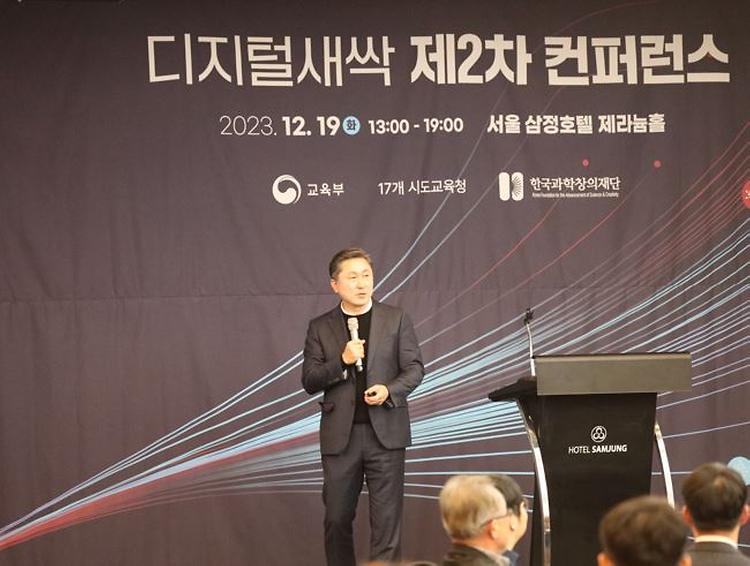
- [23.12.19] Lee Eun-seok speech at the 2nd Digital Sprout Conference
- On December 19, 2023, Professor Lee Eun-seok of Sungkyunkwan University (Software Convergence University President/SW Central University Project Director) gave a lecture on "The role of universities in the paradigm shift of education" at the second conference in Gangnam, hosted by the Ministry of Education, 17 municipal and provincial offices of education, and the Korea Science and Creativity Foundation.
-
- 작성일 2023-12-26
- 조회수 634
-
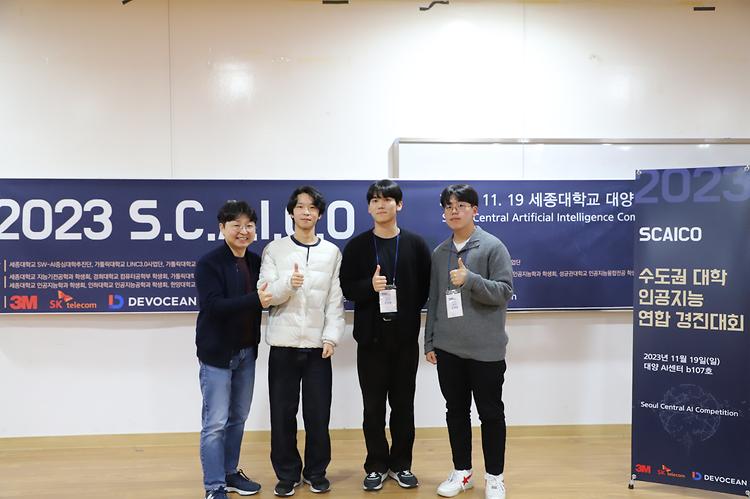
- The AI Convergence Major Idiots and RMDP Team won the Gold Award and Special Award at the 1st Seoul Metropolitan Univers
- AI convergence major idiots (Kim Myung-seop, Lee Soo-hyung, Cho Jung-hwan), RMDP (Kim Soo-min, Kim Hyun-seo, Jang Woo-hyuk), Won the Gold Award and Special Award at the 1st Seoul Metropolitan Universityies Artificial Intelligence (SCAICO) Combined Competition Kim Myung-seop, Lee Soo-hyung, Cho Jung-hwan, Kim Soo-min, Kim Hyun-seo, and Jang Woo-hyuk (RMDP team), who majored in artificial intelligence convergence at our university's Department of Global Convergence, won the gold prize (2nd place) and the special prize (SKT special prize) at the first Seoul National University Artificial Intelligence Coalition Competition held at Sejong University's Ocean AI Center on November 19 (Sun). The Seoul Central Artificial Intelligence Competition (S.C.A.I.C.O.) was organized by the SW-Centered University Project Group of the school, the Sejong University SW-AI-Centered University Promotion Group, the Catholic University LINC3.0 Project Group, the Catholic University of Digital Transformation ICC, the Konkuk University SW-Centered University Project Group, the Kyung Hee University SW-Centered University Project Group, and the Inha University SW-Centered University Project Group, hosted by the student council of each university's related departments and sponsored by 3M, SK Telecom and DEVOCEAN. A total of 13 teams from eight universities in the Seoul metropolitan area, including the school, participated through internal preliminary rounds for each university. SK Devocean Kim Sang-ki, Team Idiots (Artificial Intelligence Convergence Major, 22nd grade Lee Soo-hyung, 20th grade Kim Myung-seop, 22nd grade Cho Jung-hwan) The competition was held under the theme of producing achievements using AI-related keywarts (Trend Korea 2023) in 2023. The daft team that won the gold prize (2nd place) was awarded KRW 1,000,000 and the award was awarded KRW 500,000 and the award was awarded to the RMDP team that won the SKT Special Award. The grand prize (1st place) was awarded to the KHAI team of Kyung Hee University, and the silver prize (3rd place) was awarded to the brown sugar team of Sejong University. In particular, this competition is significant in that the student council of each department organized and hosted the event, leading the academic exchange.
-
- 작성일 2023-12-26
- 조회수 675
-
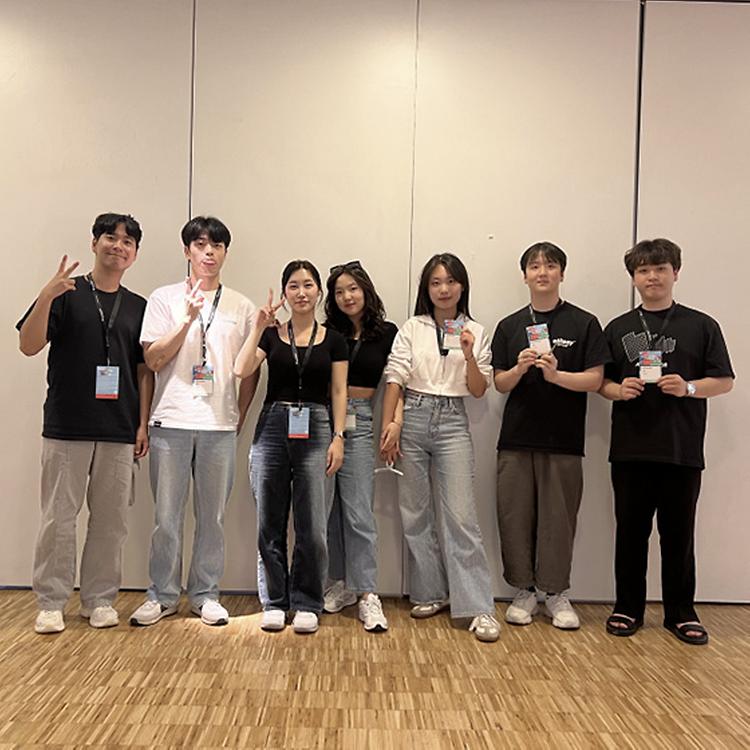
- [23.11.14] Beyond the Sight, Faculty of Global Convergence, Arts Electronica to perform art ②
-
[Editor's note: This is what happened in the previous episode] ☞ Perform art at Ars Electronica ① Q. What do you think you gained from your experience at Ars Electronica? | | City of Hope: Hoffnungburg Kim Ji-seop: I think we've gained a lot from 2023 ARS Electronica. In the process of production, I was able to grow in all stages and processes, including coordination and unity among team members, and discussion and preparation for the work. During the event, I saw various people and various artworks. In the process, I think I gained a broad perspective by broadening my knowledge of the work and talking about art and technology for art. Lee Ji-min: I personally gained a lot from successfully completing the 2023 ARS Electronica. I thought deeply about how to plan the work efficiently during the production process. During the exhibition process, I feel that I have improved my foreign language skills by explaining hard to foreign visitors with insufficient English skills. The most meaningful thing is learning how to coordinate opinions effectively. I had to prepare the works from A to Z in a shorter period of time than I thought. So I had to quickly and accurately coordinate my opinions with classmates Ji-seop. In this process, I think we could all grow and achieve results at a global media art festival called ARS Electronica. | | Discord Cho Yong-min: It felt like the view that was limited to Korea was opening up. I've heard so many things like "Frog in the Well" and "The World is Wide," but the world stage I experienced with my own eyes was different. Through the process of interacting with numerous overseas artists and explaining their works, I think I gained the driving force to go far with higher and bigger dreams in the future. | | The Universe Thinks Park Ji-hye: I don't think I would have started or finished it by myself. I was able to achieve good results because I repeatedly went through the steps of isolation and brainstorming with my team members, studied every day, made works, and received a lot of feedback from the professor. I also realized the importance of teamwork once more. When I exhibited it at ARS Electronica, I realized once again that the world is wide. I met artists from various cultures, talked about their works, and talked about their artistic experiences and what kind of work they wanted to make in the future, and it was interesting. The theme of this ARS Electronica exhibition was 'Who is the truth?' and I think I tried to keep talking because I was curious about the insights and inspiration of the artists. The bottom line is that I want to design my life with a broader perspective to experience the wider world in the future. Hong Eun-ji: The experience of participating as a student artist, away from watching the exhibition called Ars, seems to have left me with too much to be desired, not an art student. First of all, I realized that the digital art world is this big and creative. I think I was able to grow further while facing problems that I had never imagined. Above all, it was a valuable experience to freely interact with art lovers from all over the world and talk about various social issues through works of art, not the people within my boundary. Especially in Campus Exhibition, there were college students from various countries such as Japan on one side, the UK on the other, and the United States and India next to them, and it was fun to talk to them and see their works. Lastly, the city of Linz, Austria, where the exhibition was held, is very peaceful, beautiful, and academic. I spent a week here on the Donau River and made precious memories with Sungkyunkwan University professors and exhibition team members who came with me. Q. I wonder if there were any subjects that helped me during my undergraduate class. | | City of Hope: Hoffnungburg Kim Ji-seop: I majored in culture and technology convergence and learned how to approach media and content in different ways and from different perspectives. Overall, there were many classes to plan and produce content. In particular, I think I got a lot of help from Professor Kim Soo-wan's game content planning class and Professor Moon Sang-hoon's Generative Content Capstone Design class. Professor Kim Soo-wan's game content planning class reflected some of the gay elements in the work, as he had obtained the method of using the mechanism from the game. Since the work itself is a participatory type, I thought about how to engage and immerse myself, but it was possible to solve it through classes. Professor Moon Sang-hoon's Generative Content Capstone Design class came to think of the work in 'Generative', a concept generated by computers. It is now possible to construct the mechanism of the work by creating generative designs regenerated by computers with various work tools. Lee Ji-min: I think all the content planning classes for the Culture & Technology Convergence Major were helpful. In particular, Professor Kim Soo-wan's 'Game Content Planning' class was very helpful. In this class, we study the process of planning the game and the factors that must be considered. Finally, we complete our own game plan. While taking this class, I was impressed that when planning a game, I was told that users who play should consider "how immersed they are in the game." So I tried to conceive a game that provides fun based on the core mechanisms by which the game works. This part helped us a lot when we produced City of Hope: Hoffnungburg. In order for visitors to experience the work, they need to put their fingers on the sensor and stay for tens of seconds to measure their heart rate. At this time, we planned the work so that visitors could immerse themselves even when we were not around. To show that the city is created and extinguished in the virtual world on the monitor based on the heart rate measurement of the audience I made a change to the UI. To show that it is rendered in real-time through heart rate data, we implemented it through UI to prepare (load) for city creation, and UI showing signs just before the city disappears. | | Discord Cho Yong-min: There was a class called Creative Media Study in the Department of Culture and Technology Convergence. It was a class where you could learn projection mapping technology using a beam projector, create works using tools such as after effects and touch designers, and actually open small exhibitions at the end of the class. At that time, I exhibited media art works at the Cho Byung-du Hall of the school, and I think the small exhibition I experienced at that time was of great help overseas. | | The Universe Thinks Park Ji-hye: I first encountered visualizing tools in a class called Generative Content Capton Design, which I took in the first semester. I was interested in interaction media and interaction art, but I think the skills I learned from Generative Content Capstone Design helped me make this ARS Electronica work. Hong Eun-ji: There are a few indirectly helpful subjects in the Department of Culture and Technology. This year's ARS Electronica slogan is "Who owns the truth?" and it deals with artificial intelligence as its main theme. In that sense, Professor Jung Ji-yoon's 'Content Planning and Production through Artificial Intelligence' helped me to get into and understand very basic AI common sense. Next is Professor Kim Ji-yoon's
class, and I was inspired by a digital art exhibition called 'Bunker of Light' on Jeju Island, which was impressive at the time, and I enjoyed writing the work plan. I think that experience helped me write the Ars exhibition plan or Tech Rider. Lastly, Professor Kim Soo-wan hosted this exhibition, and thanks to my professor's class, "Game Content Planning," I was able to ask and challenge myself comfortably because I had no art experience and was scared. Q. Why do you think art exists in the world? | | City of Hope: Hoffnungburg Kim Ji-seop: I'm not an art student, so I don't know all about art, but I think the art I've been through is a medium for another expression of 'I'. When you communicate with others, you communicate in many forms, such as texts through text messages and kakaotalk, and emoticons and gifs in the form of images beyond this. I thought art was one of the means of fully expressing the message that I wanted to convey with words, texts, and images beyond. I think carefully that's why art exists. Lee Ji-min: I don't know how to explain it because I haven't learned art. What I felt at 2023 ARS Electronica is that I think art can be a way of 'communication'. Everyone who participated in the exhibition from all over the world had different messages to convey, and the way they delivered him was different. However, when I explained the message through the work, there was a part that touched me more. So I think art is a way of communicating. Art is still difficult for me, even now! | | Discord Cho Yong-min: I think art is a human instinct to covet beauty. There are so many creatures in the world and so many higher life forms, but I think art is the point where we can clearly distinguish them from humans. I think it is the beginning of art that humans have pursued another new desire since they reached the peak of all living things beyond hunger and the desire for breeding, and have created a depth of thought in a more high-level direction. The reason art exists in the world is that we evolve in a higher dimension. | | The Universe Thinks Park Ji-hye: I think we can find art in our lives, in our daily lives. Actually, as soon as I was asked this question, my fashion club came to mind. At the beginning of the semester, the theme of the activity of selecting a look called street snap and going out was "fashion expressing myself," and the first question I received when I conducted a short interview after I was released was how to express myself through the theme of "fashion expressing myself." At the time, I said, "I think fashion is the process of creating your own work by combining various colors, patterns, and styles, like art. Some days I can express myself by wearing comfortable, casual looks, and some days I can choose elegant and colorful outfits. Not only fashion, but I also feel like I'm someone who keeps trying new challenges." I don't know much about art, but I would say that art is freedom of expression. I think art exists to express one's feelings and thoughts freely. Hong Eun-ji: I'm ashamed to answer these questions because my knowledge of art is shallow, but I think I can answer that art has no choice but to exist because there are people living on Earth. I think we all have an instinct to express and share our inner thoughts and feelings. If someone responds to it and feels something, I think it's called art. As I encountered tens of thousands of works at the Ars Electronica exhibition, I thought a lot, 'What is art, to what extent is art?' When I sympathize with the person who created this, "Did you mean to say this?" the message was more memorable. The greater the emotional experience, the more intense the memory is, so Ars Electronica seems to function to imprint the problems of the times as art to people all over the world. Q. Lastly, please say something to the students of Sungkyunkwan University. | | City of Hope: Hoffnungburg Kim Ji-seop: I think there are a lot of classmates who are thinking about whether they are on the right path. Of course, it's the same for me. Is this right even on the street? There may be times when I want to, but I always think that it is the process of finding the correct answer even if I take a detour. I'm also looking for my way, and I think I'm still wandering. I want to say that everyone has no destination, no correct answer. But I want you to try various things to find your way. It won't be easy for me to find my way, but I hope my vocal classmates can cheer up and find my way together! Have a happy day today! Lee Ji-min: I want to become a vocal student who tries everything he wants to do. I was excited to enter the international stage while preparing for 2023 ARS Electronica, but I was also afraid. However, it was an experience that I gained a lot through challenges, and it became an unforgettable memory of my college life. I hope you become a proud vocal student who challenges and produces results together. 2023 is just around the corner. I hope you all end the year healthy! | | Discord Cho Yong-min: Sungkyunkwan University is definitely a proud and great school, but there will be nothing we can gain if we don't do anything just because we are admitted. If you look a little bit, there are various opportunities and systems that schools, and many professors, have created for students. I hope other classmates will also actively participate in the various good opportunities provided by the school and gain valuable experiences. Thank you. | | The Universe Thinks Park Ji-hye: I think we need to seize the opportunity that came like a coincidence. In the past, I thought I needed to improve my skills because I was not good enough, but now I think I should try even if I am not good enough. If you try it, you might think, "I should have done it in the beginning," or you might think, "As expected, it doesn't fit me." But I think it's important to quickly eliminate areas that don't fit me and try something else. In a way, I discovered myself that I didn't know. I want to tell you that you have to take the opportunity. It's better to try and regret it than to regret it without trying it! Hong Eun-ji: It reminds me of the words of Lee Min-jin, author of Pachinko, to respect and cherish your inner curiosity. When I'm curious about something, I think I have to ask and challenge myself to bring unexpected experiences and opportunities. I hope more Sungkyunkwan University students will have a chance to participate in Ars Electronica next year. Thank you! -
- 작성일 2023-11-20
- 조회수 698
-
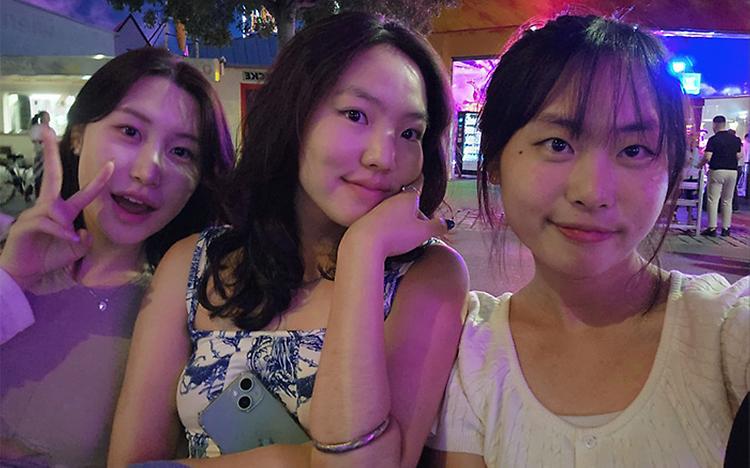
- [23.11.14] Beyond the Sight, Faculty of Global Convergence, Arts Electronica to perform art ①
- The International Media Art Festival, ARS Electronica, was held in Linz, Austria, from September 6 to 10. The festival, which was held around the core agenda of the AI era, says that humans themselves need to ask questions about truth, ownership, rights, control, and responsibility under the theme of "Who Owns the Truth?" Students majoring in culture and technology convergence at the Department of Global Convergence also participated in the Ars Electronica Festival and performed their own art to their fullest. Under the same team called Beyond the Sight, they were divided into City of Hope: Hoffnungburg [Kim Ji-seop (18), Lee Ji-min (19), Discord [Cho Yong-min (18), Park Joon-ha (Cultec/Video 19), The Universe Thinks [Hong Eun-ji (Cultec/Consumer Studies 20), Park Ji-hye (Cultec 20), and Lee Soo-min (Cultec 20). Students said they received a lot of inspiration and feedback from interacting with various artists through this experience. Let's meet Beyond the Sight, who has gained a great driving force in taking the leap to the wider world. Q. Hello. Nice to meet you. Please introduce your work. | | City of Hope: Hoffnungburg Lee Ji-min: City of Hope: Hoffnungburg is an interactive art form that requires participation from visitors. Visitors measure their heart rate through a heart rate measurement sensor. And appreciate the virtual cities that are created. The audience's heart rate data is used as a medium through which the virtual city of Hoffnungburg is created and destroyed. In fact, it was designed to create a virtual building according to the heart rate of the visitors so that each visitor could build a different virtual city. We produced 3D works using Unreal Engine 5, and Arduino and heart rate measurement sensors were used to render data in real time. | | Discord Cho Yong-min: Discord is a media art installation artwork that utilizes projection mapping, objects, and sound effects. It is produced in the form of installation art as a means of effectively delivering messages to the audience, and video media and sound effects are repeatedly played in the form of loops. Discord makes the audience feel audiovisually that an object representing the Earth is unstable due to the sounds of disgust and conflict. The sound generated by the woofer speaker shakes the earth-shaped spherical object connected by wire, and according to the sound, the image reacts as if it were covering the shadow of the spherical object. Through this, the audience can look back on our society and pursue peace by conveying the message that small sounds of hate and conflict can shake the whole planet. | | The Universe Thinks Hong Eun-ji: The Universe Thinks is an interactive piece that expresses the uniqueness of human intelligence with data visualization tools. Three data (average number of filament strands of neurons and cosmic giant structures, beta wave data, and voice frequency data) were used in the work. These three types of data overlap and change throughout the exhibition, including real-time voice data from visitors collected through the microphone. Q. What message did you want to convey through this work? | | City of Hope: Hoffnungburg Kim Ji-seop: The main exhibition theme of ARS Electronica was 'Who Owns the Truth?' Through this exhibition, our team thought about the relationship between artificial intelligence and technology. In fact, I thought that the Fourth Industrial Revolution was an endless development in technology, and that the living environment changed rapidly as it efficiently handled vast amounts of data that were difficult for only humans to handle. Our team thought that only humans could develop technology, and artificial intelligence was also looking at it from the same perspective. So I wanted to show through this work that the full owner of this technology is human. | | Discord Cho Yong-min: Our team thought about what would be the biggest issue that people all over the world could share in common in modern society. Then, I came up with the idea of conveying the message that if small hatred and discrimination spread, it could return to a big conflict, and the work "Discord" started from there. Conflicts on large and small scales have always existed historically, but in modern society, diversity and equality are especially respected, and conflicts between traditional and new perceptions are emanating with the development of the media. In response, our team defined the global spread of mutual hate and discrimination as the biggest fundamental problem in modern society and wanted to raise the audience's awareness of these problems. Through Discord, the sound of hate and discrimination is shown to the audience audiovisually to shake the Earth unstable, allowing the audience to reflect on hate and discrimination and ultimately displaying the work with the aim of peace. | | The Universe Thinks Hong Eun-ji: ARS Electronica held this year's festival based on the question, "Who owns the truth?" Our team, who was interested in digital art, came across a public offering program held by the Department of Culture and Technology Convergence in our school. Since the era of Asian Super Intelligence (ASI) is not far away, we started brainstorming with the question, "Is our intelligence really special?" Then, I learned that the human neuron neural network and the universe's giant structure not only externally resembled, but also had excellent mathematical similarities among many natural phenomena, and I wanted to convey the message that "nature itself represents the uniqueness of human intelligence." Q. I wonder if there are any differences compared to the work I've been doing so far. | | City of Hope: Hoffnungburg Kim Ji-seop: I haven't done many works to compare them, but when I've done them, I wanted to show the convergence of technology and art. In this work, I wanted to create something that develops the work by interacting with external "machines," so I made a production using "Arduino," which others may be familiar with. In the past, if we had manufactured with devices with clear usage and utilization, it seems that designing a machine to expand through Arduino was different from the work we had done so far. Lee Ji-min: I've never made a finished work before. I've had a few experiences planning games and organizing teams so far, but I've never made art like this before. The City of Hope: Hoffnungburg exhibition at the 2023 ARS Electronica is my first work. Compared to game production, I think the characteristic of this interactive art work is that it was able to implicitly express the message I wanted to convey. Games and our works (interactive art) have something in common that they only work with user manipulation. However, while games are designed and produced to deliver "fun," I believe the purpose of interactive art is to deliver a key message through the display. I think this is different from the previously planned content. | | Discord Cho Yong-min: As our team consisted of the Department of Imaging and Nuclear Communication, we had experience producing many works such as motion graphics and movie videos. I've also worked on commercial advertising videos and music production, but most of them were for the general public in Korea. This exhibition at the ARS Electronica Festival was new in that it featured works with numerous foreign artists on the global stage. The genres were really diverse, and I was able to have cross-border exchanges by talking to high-quality artists. Numerous artists and audiences in Europe did not just appreciate the work, but shared and agonized over the meaning of the work by giving constructive feedback. In the process, we were able to have a differentiated exhibition experience that was not possible in Korea. | | The Universe Thinks Park Ji-hye: Before that, I only made works with class projects and I didn't have much experience in making works, so this ARS Electronica was my first step as an artist. As it was my first time, I was disappointed with myself because I didn't know many things and was inexperienced. Honestly, I still don't know what art is. I suddenly think that not knowing what it is will be art. I think when I came back to the text and felt disappointed that I wasn't good at it and didn't know, I rather acknowledged that I didn't know and thought about what I could do and what was the next step. There were many things I've never seen before, and I stayed up all night to make it happen, but I think I could see my limitations. Hong Eun-ji: It's the first time I've ever been involved in digital art or creating exhibition works, not art majors. All they showed in front of people was pictures or videos edited for club performances or hobbies. But everything was a new challenge as I participated as an artist in a global digital art exhibition. Q. Is there a memorable episode that happened during the creative process? | | City of Hope: Hoffnungburg Kim Ji-seop: Most of all, what happened at the exhibition hall was the most memorable. During the exhibition, the role of curator was also performed at the same time, but it was difficult to explain in English and a second language, not Korean, but the audience's position was similar to ours. Even if we didn't understand each other in words, it was most impressive to understand the flow of the conversation. Lee Ji-min: I remember working all night at Hyehwa Cafe. There was a large-scale revision during the production process of the work, and at that time, there were signals saying, "Let's finish it even if we stay up all night." In the late hours, we took turns taking a nap for an hour to cheer each other up, and eventually we completed it. | | Discord Cho Yong-min: Originally, the concrete object to be used in the work was planned to be made using a 3D printer, but the professor who saw the plan asked me to make a prototype by the next day. At that time, with the mindset that the project might fail if I couldn't make a prototype, I remember using woodlock bought at a stationery store and making it by hand for nearly 20 hours. It was difficult at that time, but when I think about it, it was an essential process in the process of making the work. |The Universe Thinks Park Ji-hye: It was fun extracting EEG data measurements myself. Three brainwave data were used to show human intelligence, and beta wave data was extracted from five types of brainwaves. During the meeting, I recorded the EEG data, Eun-ji recorded the data when writing the book report, and Sumin observed the changes when memorizing the play script. It was amazing because it was my first time recording EEG data. Hong Eun-ji: When I look back on the creative process, I remember worrying about whether it would work out as the first runner of Sungkyunkwan University and working in a hurry on Deadline that suddenly appeared. A fun episode was when we first extracted brain waves with an EEG meter. It was fascinating when our EEG graph was drawn on the iPad screen after successfully connecting to the machine. When I closed my eyes and was relaxed, I saw the alpha brainwave data go up, and when I imagined or focused on something, I watched it fluctuate in the beta brainwave quite interestingly.
-
- 작성일 2023-11-20
- 조회수 746
-
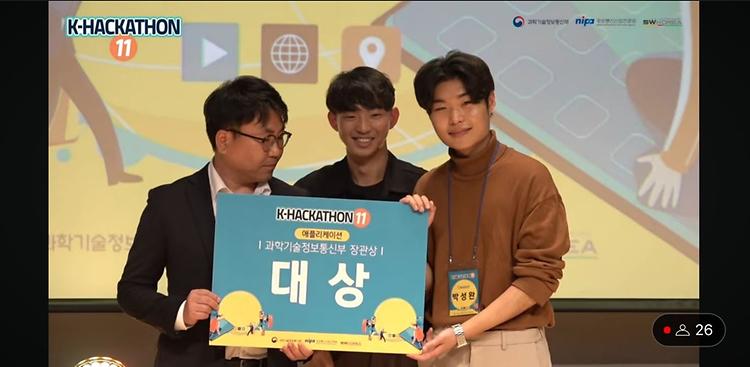
- [SPARK] 2023 K-Hackerton Awards (Minister of Science and Technology Awards)
- The SPARK team, led by industry-academic professor Park Hee-sun, won the grand prize at the 2023 K-Hackerton. The 2023 K-Hackerton hosted by the Ministry of Science and ICT is It is a challenge based on digital new technology convergence solutions (SW, AI, IoT, metaverse, etc.) to solve special problems in people's lives and communities. A total of 21 teams that passed the regional preliminary round advanced to the finals and won the grand prize through the announcement of the finals. ------------------------------------ The 11th K-Hackerton Grand Prize in 2023 - Entry: CareBot (Interactive Recording Emotional Diary via Generative AI) > Topic: Developing CareBot to help ease the daily stress and depression of modern people >Function Developing a Korean LLM with GPT-based empathy to create an interactive recording diary Record the user's experience and remind them of when they experienced something similar and how they resolved it to provide customized feedback Provide diary summary and emotional analysis results focusing on the conversation content (emotion by human relationship, Emotion analysis by case) - Participants: Park Sung-wan (fourth grade in software), Song Hyun-bin (fourth grade in software), Kang Seok-hoon (department of biomecatronics/computer engineering and informatics), and Kim Jae-young (system management/ computer engineering and informatics) - Leadership: Industrial-academia Professor Park Hee-sun - Award details: Grand Prize (Minister of Science and Technology Information and Communication Award) - Prize money: 5 million won
-
- 작성일 2023-11-20
- 조회수 509
-
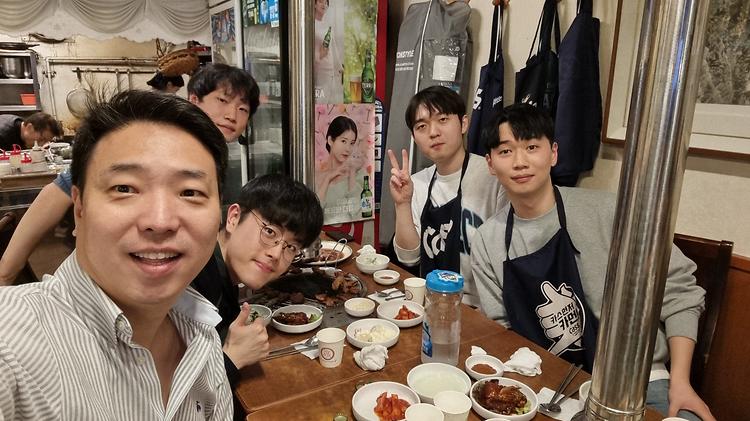
- [SKKU's Special Lecture] Youtube comment event meal coupon[Prof. Ryu Eun-Seok]
- Lee Kyun-seo, a student in the 19th grade, was selected as a comment event in October, He used a meal ticket with Professor Ryu Eun-seok :) Q. Students What would be the coolest and most novel future virtual reality service you could imagine A. In fact, there have been cases in which training is conducted using virtual reality, such as video simulation shooting in recent reserve training. Then, if you create a really realistic simulation environment, I think you can replace your service and training with virtual reality without going to the military. If so, I think a really cool new world will unfold!! Corresponding link ↓ Development of Virtual Reality Technology | Ryu Eun-seok, Professor of Realistic Media Engineering at Sungkyunkwan University - YouTube
-
- 작성일 2023-11-20
- 조회수 470
-
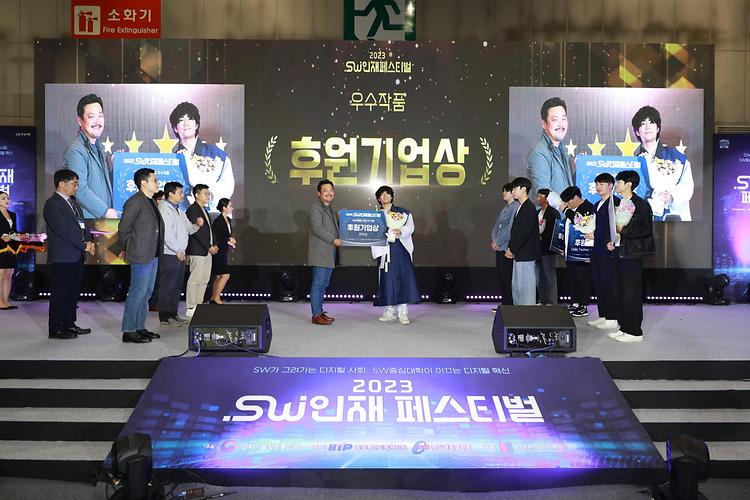
-

- Excellence Award of Hackathon and Convergence Security Council 2023, Kim Jin-moo (Software Department 23) Hakwoo
- The 2023 Hackathon and Convergence Security Council was held on two days on August 24 and 25 at the Natural Science Campus. Unlike last year, this hackathon was conducted in CTF (Capture The Flag) format. It is a method of obtaining points by submitting the flag obtained by finding vulnerabilities in the program and attacking it to the competition site. In 2023, the hackathon and convergence security council presented questions in four areas: system hacking, reverse engineering, crypto, and blockchain. Professor Kim Hyung-sik, who oversaw the event, aimed for a competition where participants could immerse themselves in the event and focus on problems rather than competition, and for this purpose, a tutorial by a professor who presented questions in each field was conducted before the CTF competition began. Various teams won the award in the field of learning through immersion, and among them, Kim Jin-moo of the "23rd Class Freshman Team," who participated as an individual, received the Excellence Award. Kim Jin-moo has participated in a number of hacking defense contests since he was a high school student, dreaming of becoming an information security expert. She won first place in large-scale contests such as the White Hat Contest and the Wacon, and also enjoyed the pleasure of winning individual competitions such as the Dubai World Hacking Defense Conference, Code Gate and the National Youth Information Protection Festival. Kim Jin-moo does not stop at solving problems, but instead runs a hacking defense contest, presents questions, and shows his passion for hacking. Let's listen to the story of Kim Jin-moo, who is constantly developing in search of his weaknesses. Q. Hello. Congratulations on winning the Excellence Award in the '2023 Hackathon and Convergence Security Council'. I'd like to hear your thoughts. Hello. Thank you for congratulating me. Thank you to the professors for holding a quality problem and a competition with good intentions. I thought it was a great opportunity to prove the knowledge I had studied so far at Sungkyunkwan University. I was worried that most of the participants would be able to do well because they were a team of graduate students, but it is an honor to get good results. I'm thankful and proud because my friends, especially my parents, seem to be happier than I am. Q. How did you feel about this event? Since I have always participated in hacking defense competitions with the mindset of winning first place, I participated with the mindset of winning first place again. After entering college for the first time, I enjoyed my school life with my colleagues and concentrated on my studies, so I participated with the mindset of starting a new start. I thought it was an opportunity to look back and check my skills by participating in a single team. Q. Is there an episode that you remember that it wouldn't have been easy to solve a problem by yourself in 23rd grade? There were two questions in the blockchain field, but I remember shoveling a simple question for three hours because I didn't have any knowledge of blockchain. It was solved by almost all teams except me, but I think I was the only one who couldn't solve it, so I kept holding on. So I realized that I had a misconception of the memory structure of the smart contract after trying many things with the debugging method you explained in the tutorial session, and after three hours of shoveling, I was able to solve the problem. After solving it, I felt like I would have solved it easily if it was the knowledge I knew. If I hadn't used the debugging tools I learned from the tutorial, I couldn't do this shoveling process at all, so I thought that conducting the tutorial before the contest was a very good way to fit the purpose of the contest. Q. What did you gain from this experience? I learned about new concepts related to smart contract, PAC attack, and I was able to understand them deeply by solving them myself. It was difficult to find motivations and seniors who were interested in hacking around me, but by participating in this competition, I learned that there are undergraduate and graduate students who are interested in hacking. I thought I would have more experience and knowledge to gain from working with students and great professors who are interested in security in the future. Q. I wonder why you became interested in hacking. I was curious about the word hacking itself, and I was wondering if I could take it as a job. "You can prevent hacking by analyzing vulnerabilities and patching them in advance," I heard it said, "Information security experts can hack legally." I think that's when I started studying. Q. You've been participating in many competitions since you were a high school student, so please share your stories and personal tips. I have a personality that motivates me only when I have a goal, so I decided to win the Hacking Defense Contest as the hacking defense contest. At first, I got a sense of the hacking problem by solving various problems on a war game site that solves hacking problems, and then I participated in various hacking defense contests to solve the problem. I repeatedly solved problems that I couldn't solve during the competition by looking at the problem-solving report, but in this respect, hacking seems to be similar to math. I got a lot of help from my high school senior in this course. During the first few months of studying hacking, I think I asked every day what I didn't know and what I was curious about. In the beginning, I lacked the sense of vulnerability analysis and attack to the extent that I solved the problems myself, and I asked my seniors for hints or referred to solving problems on the Internet. In this process, I contracted a lot, but I was able to see myself developed enough to solve most of the problems by myself at some point. As soon as I got the hang of it, it seemed that my skills were naturally accelerated. Since then, whenever I participated in competitions such as the Ministry of National Defense, Code Gate, and Dubai World Hacking Defense Competition, I think I have maintained the top ranks in the finals and made a name for myself in the youth department. I think it's most important to do it consistently and set goals. If you have an acquaintance who can accept questions about what you don't know and support you, you will be able to gain knowledge more easily based on your previous trial and error and experience. If you're interested in CTF, please contact me personally and I'll do my best to help you out. In addition, we plan to focus on upgrading services such as adding the Jongno 07 bus timetable, which has recently entered the school, displaying congestion through user data of the Sukbus app, and adding notification functions. Mobile app accessibility will also be improved so that all Sungkyunkwan University students can use the Sukbus app without any inconvenience. In the long run, I would like to ask the question 'Why?' that I had at the beginning of the semester in a bigger world beyond Sungkyunkwan University. My goal is to be a developer who finds another inconvenience there and solves it in my own way.
-
- 작성일 2023-10-13
- 조회수 421




